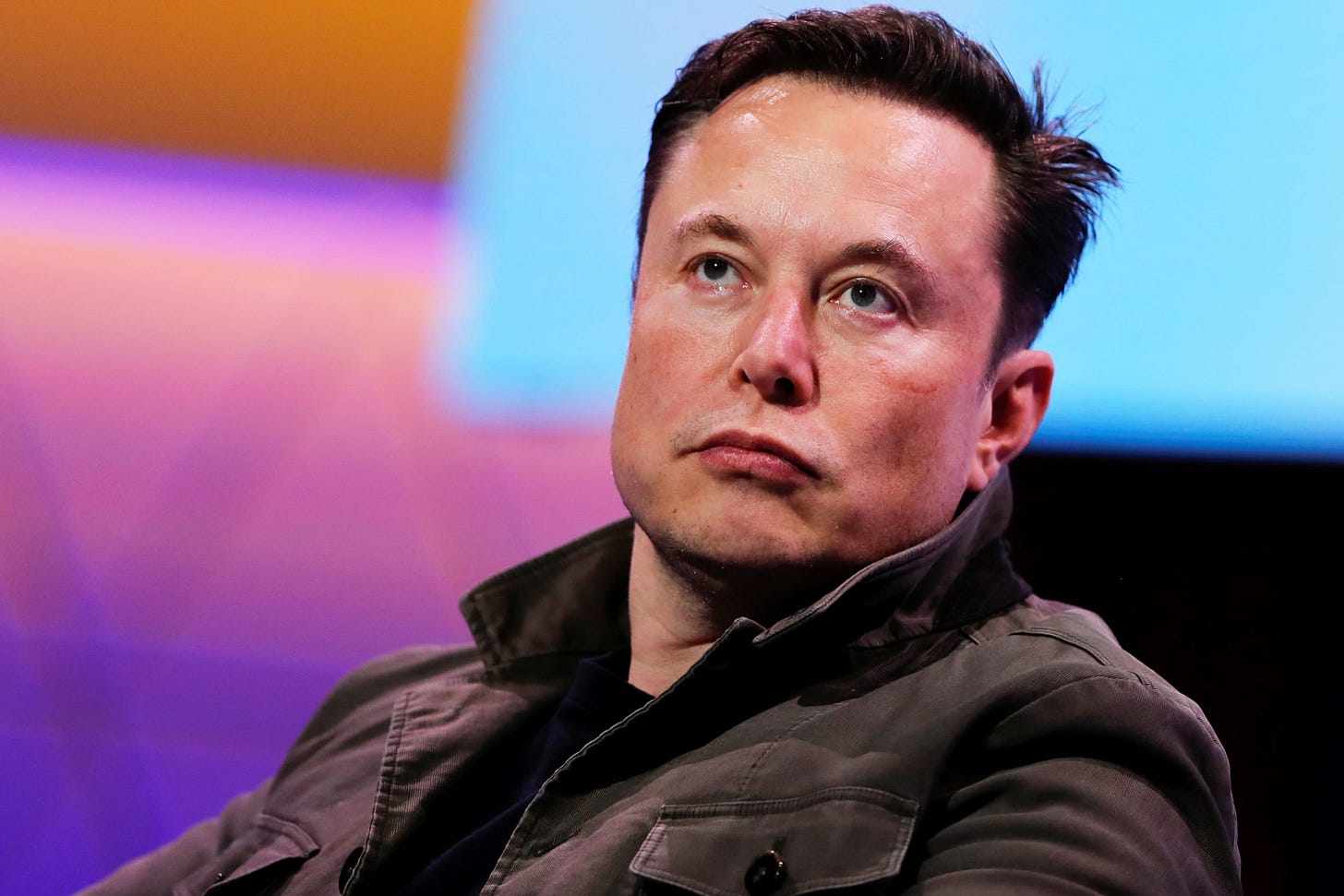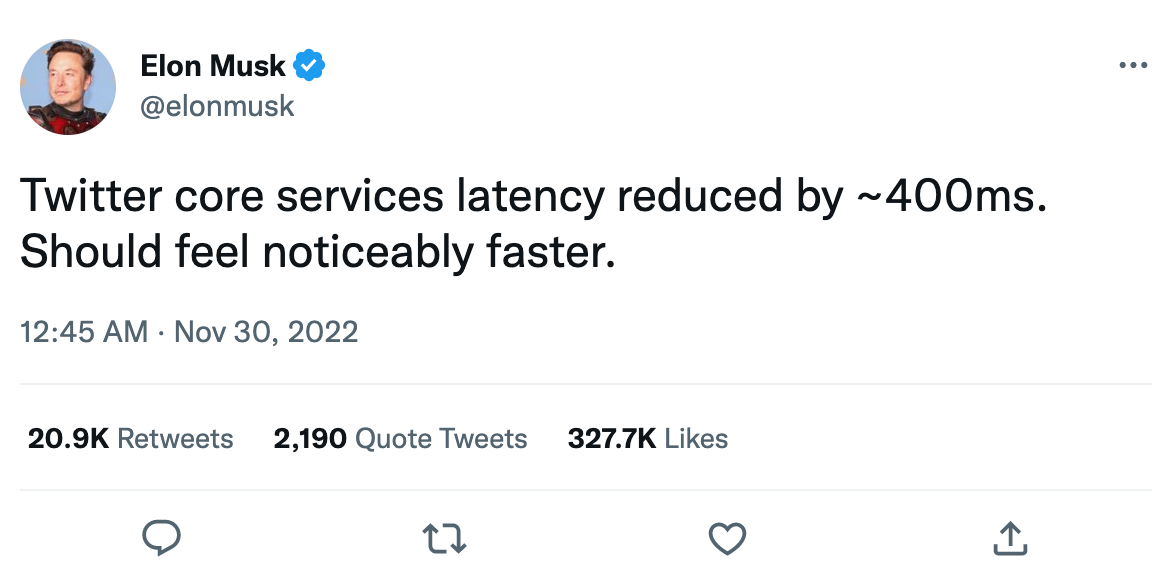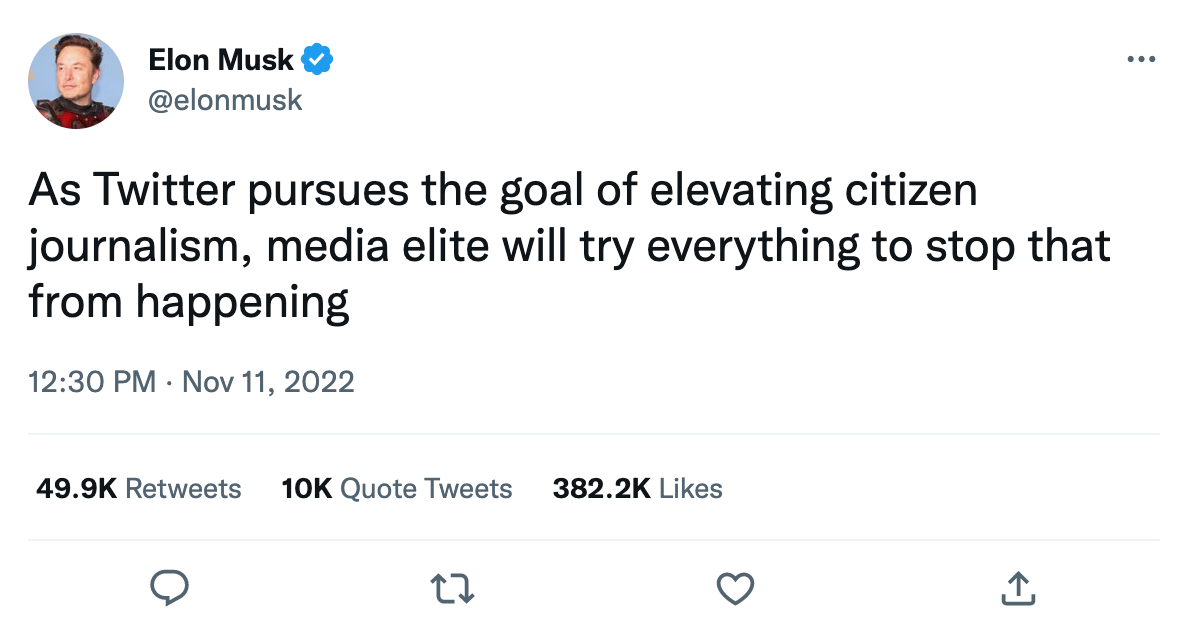Making sense of Elon Musk
How the billionaire’s long-held views are shaping the future of Twitter
For those of us still on Twitter, much of our digital attention this week was dominated by the release of the so-called “Twitter Files.” These were internal communications from Twitter’s prior owners that clarified how Twitter executives made content decisions during the U.S. elections of 2020 and 2022, and the riot at the Capitol in January 2021.
The debates centered on three key findings: (1) Twitter executives had limited the reach and visibility of Conservatives more so than other accounts; (2) Twitter executives were in regular contact with U.S. government agencies, including the FBI and Department of Homeland Security, regarding accounts to suspend or suppress; and (3) Twitter executives created rules on-the-fly in order to deal with a rapidly-evolving political situation. None of the revelations was surprising on its own, yet in combination they formed an attractive conspiracy theory of the deep-state coordinating with tech to silence one political party and pre-determine election outcomes. That’s not what happened, but there were prevailing interests that would have us believe that it did.
One of those interests was Elon Musk, Twitter’s new owner. Elon provided approving commentary throughout the “Twitter Files,” provoking backlash from journalists, scholars and activists for supplying oxygen to conspiracy theorists and election deniers. Some also noted that Elon’s cause célèbre of “free speech” seemed to contradict his past limitations on speech, including suppressing union organizing at Tesla or requiring his employees to sign non-disclosure agreements.
But why release the “Twitter Files” in the first place? What are Elon’s motivations? What’s informing his worldview and how are those ideas shaping his broader vision for Twitter?
I do not know Elon personally; however, as historians we’re always searching for clues in the past that offer a window into the present. With Elon, the breadcrumbs have been dropped in broad daylight; through interviews, research and a bit of “history intelligence” (my term), a broader ideology begins to emerge. There are three clashes are at the heart of the public debates, clashes that are equally about power and who should wield it as they are about substance. These sharp collisions are playing out on Twitter for all to see, and how Elon views himself and others is shaping how the platform evolves.
Clash #1: An integrity problem v. an interference problem
The first clash is an “integrity problem” versus an “interference problem.” To explain this requires some context.
That Elon’s purchase of Twitter brought criticism from journalists, academics and Progressives should not surprise us. As I chronicled in my book chapter on Twitter, the bonds between these sectors strengthened considerably during the 2010s, particularly online and, particularly, in response to Donald Trump. During the Trump Presidency, Twitter became more politically Left than the U.S. population. The average Twitter user was more educated, more likely to identify as a Democrat, more sympathetic to social justice causes, and likely to earn more than the average U.S. citizen.
At the same time, as has been reported, Twitter’s employees contributed 99 percent of their political donations to Democrats, and, as Elon posted online, had a closet of #StayWoke t-shirts. In leadership and user base, then, Twitter was the friendliest social media platform to Progressives, far more than YouTube, Facebook, Reddit or Instagram.
Progressives spent a lot of time on the site as a result, particularly journalists and academics. In some instances, Twitter made these intellectuals famous; the Twitter algorithm did, in fact, grant more visibility to verified journalists, boosting their content, granting them exposure, and driving traffic and business. Twitter was both politically and personally advantageous for the intellectual classes. Any ownership change was bound to invoke some status anxiety.
But journalists, academics, educators—and I will include trust & safety professionals here, too—are also in the business of information integrity. In other words, for these professions the substance of a message matters: whether it is factual, accurate, harmful, etc. When Elon took over, these professions had immediate concerns over what would happen to the integrity of information on Twitter. How badly would the billions and billions of tweets be muddied with misinformation and disinformation?
That is not Elon’s principal concern (though he has promised to give it attention), which is one reason why there has been such a public clash. Elon’s principal concern is to solve an interference problem, and to explain this again requires some context.
Elon has spoken publicly about how he views problems through an information theory framework. Information theory, which you can read about in the Encyclopedia Britannica, is a mathematical framework, not a journalistic or humanistic one. It is not concerned with the substance of a message—its meaning, its accuracy, its intrinsic value. Rather, its principal concern is getting messages from point A to point B with as little interference as possible. Information theory insists that solving the technical problem is the necessary first step in developing any reliable communications system.
This is why Elon has doubled-down on engineering while laying off staff focused on marketing, public relations, and trust & safety (in addition to wanting to save money). It is also why Elon has consistently tweeted about Twitter’s improved network performance and reduced latency under his leadership. Elon’s first priority is to optimize the technical efficiency of Twitter so that it can massively expand its capacity for users and what types of data pass through its channels (longer tweets, larger videos, multiple live streams, etc.). For Twitter to become a content network that can rival TikTok or Amazon, it requires a huge engineering upgrade.
This explains Elon’s emphasis on “hardcore” engineering as central to his vision for where Twitter goes next. Where do the “Twitter Files” fit in?
Another key tenet of information theory is that one must eliminate noise from communications channels in order for them to operate efficiently. When messages are transmitted over a channel, they are subject to interference (noise). That interference muddies the messages and influences how they are received. If Twitter is a massive channel through which to send messages, the primary problem for Musk is how to make those communications as efficient and noise-free as possible.
Within that framework, government and journalism can both be construed as noise. If government is censoring messages, or instructing a network to remove messages, that interferes with how communications among citizens get from point A to point B. Journalists can also be interference; messages mediated through the press, or framed and shaped by journalistic imperatives, make the transmission of messages between citizens less efficient.
The purest communication network would be to remove the middlemen of government and journalists and empower vox populi to speak directly among itself. Releasing the “Twitter Files” is proof, then, for Musk, that in the prior iteration of Twitter, there was an unacceptable amount of interference (noise) affecting the transmission of information. Whereas government and media may see that interference as a positive because it improves the integrity (substance) of the messages on the network, Musk sees it as a negative because it increases the interference (noise) on the network. Two different worldviews, solving for two different problems.
Musk’s views make even more sense if one views government and journalism not only as interference, but also as actors who manipulate the voice of the people in order to consolidate their own power. That leads to clash number two.
Clash #2: Reverence for legacy institutions v. animosity towards legacy institutions
It was clear from my research for History, Disrupted that many stakeholders in Silicon Valley hold disregard for both governments and journalists (not to mention humanities scholars).
As one Silicon Valley insider explained to me, “If you’re trying to remake institutions, you can’t pay too much respect or have too much awe for what happened previously.” Humanities departments, corporate media, government bureaucracies… these legacy institutions operate slowly and methodically, and, as such, are antithetical to a tech ecosystem premised on speed, efficiency and disruption.
The same insider confided to me that, in particular, tech does not respect journalism. Musk has made no secret of his displeasure with journalists; he has tweeted how journalists should not receive any preferential treatment, a sentiment I also heard in many Clubhouse rooms. In the early days of Clubhouse, when there were only several thousand users on the platform, many tech entrepreneurs made similar comments about journalists that were quite eye-opening.
Musk has also spoken publicly about empowering the people against government, stating on YouTube that, “Government is just a corporation in the limit. It’s the biggest corporation of all, and it’s got a monopoly on violence. If you don’t like corporations, you should really hate government.”
The “Twitter Files,” then, were a forum for Elon to antagonize two of his favorite targets. (Elon is notorious for trolling his adversaries). By disclosing the actions of government agencies to monitor Twitter, Elon could confirm his own fears of state power, government overreach and limits on individual expression.
Elon could have granted access to legacy media such as The New York Times, Washington Post or Wall Street Journal. Those outlets would have vetted the material according to their editorial processes and published them as breaking news. Instead, he chose independent writers Matt Taibbi, Bari Weiss and Michael Shellenberger, each of whom have been vocal critics of such institutions. By choosing to amplify these writers via his massive Twitter following, Musk elevated voices that more closely aligned with his worldview.
It’s worth noting, too, that there were many writers of color that Musk could have elevated had he wished, yet chose not to. This leads to a deeper, more unsettling question, namely whether the battle between legacy media and Silicon Valley pits one white savior complex versus another; a legacy media that is 75 percent white that sees itself as saviors of democracy against a venture capital class that is more than 80 percent white that sees itself as saviors of civilization. That leads to clash number three.
Clash #3: Saving democracy v. saving civilization
In his book The White Savior Film: Content, Critics, and Consumption, sociologist Matthew Hughey argues that the white savior motif has “saturated our contemporary logic.” Without getting too much into the scholarly weeds, the importance for our purposes is to recognize how messianic white characters appear and re-appear across our media, political and philanthropic landscape, including in journalism and tech.
For many journalists, the talking point of the past decade has been that they are critical to the endurance of democracy, particularly in the United States. Journalists—the journalists argue—are the principal defenders of the democratic order, and, as such, their salvation is also society’s. This rhetoric can be found from the stages of the Aspen Institute to the masthead of The Washington Post. Whether one believes it wholly, partially or not at all, for our purposes we should simply recognize the echoes of prior white savior narratives within these new ones, wherein the virtues, heroism, intellect and talents of the white protagonist are all that stands in the way of a complete collapse of civilized society.
Not coincidentally, this is precisely how many Silicon Valley venture capitalists view themselves, even if they sit on the opposite side of the ideological spectrum. As Hughey writes in his book, the savior trope is a flexible one equally applied across political lines. The Nigerian-American writer Teju Cole once quipped in The Atlantic that “the fastest growth industry in the US is the White Industrial Savior Complex.”
Indeed, on the website of the Founders Fund, a venture capital firm in Silicon Valley run by investor Peter Thiel—who created PayPal with Elon Musk—resides the sentence, “The entrepreneurs who make it have a near-messianic attitude and believe their company is essential to making the world a better place.” To be a savior of society is foundational to the ethos of tech, Elon Musk foremost among them.
Thiel and Musk share another commonality, namely that they are both subscribers and large donors to a school of thought known as “long-termism.” Long-termism emerged principally out of Oxford University and is considered by one observer to be the “most dangerous secular belief system in the world today.” Long-termism has a messianic religiosity about it, a belief that humanity has an ordained and glorious future ahead of it that must be reached at all costs. In this view, today’s wars, deaths, famines, starvations, racial and civil injustices and all other maladies are blips on the cosmic calendar. What really matters is re-engineering our bodies to create a superior race of post-humans that can colonize other planets in order to expand humanity across the known galaxy.
If these concepts sound familiar, it’s because they are two of Elon’s billion-dollar projects: Neuralink, which is developing implantable brain–computer interfaces, and SpaceX, whose stated goal is to reduce space transportation costs in order to facilitate the colonization of Mars. In Elon’s worldview, he is the messianic figure that will enable humanity to reach its long term potential, an environmental and planetary savior now in control of a massive information and communications network. As Elon himself has tweeted, “This is a battle for the future of civilization.”
What it means for Twitter moving forward
What does this mean for the future of Twitter?
At the platform level, Elon surely recognizes that the near-term future of social media is content creation. YouTube, Twitch, TikTok and Instagram each have more users than Twitter because they are, at heart, user-generated content networks that privilege video and interactive media. For Twitter to compete, it must increase the amount of traffic it handles and the types of content it supports, to include long-form tweets, longer videos, live streams, live sports, news, gaming, live audio and user-generated programming.
Musk also understands that the more users on a platform, the more valuable it becomes. He will seek to attract new users by adding features, creating hype and buzz, delivering entertainment and spectacle, perhaps incorporating cryptocurrencies, and making the platform more user-centric and less expert-centric—likely to the chagrin of journalists, academics, and government officials.
More broadly, Twitter will become for Musk another form of leverage in the battle to take power away from legacy institutions he sees as unjust or illegitimate. PayPal took power away from traditional financial institutions. Tesla has taken power away from fossil fuel companies. Now, Twitter will seek to take power away from journalists and media companies, a sentiment that will delight many in Silicon Valley who have been considering doing the same.
Meanwhile, Neuralink will continue to pursue super-intelligent post-humans, and SpaceX will continue to pursue space expansionism and colonizing planets. Elon’s Twitter account will be used to propagandize both efforts. Along the way, he will share memes, jokes, quips and trolls. Elon has said several times that if Occam’s razor posits that the simplest answer is the most likely one, he believes that the most ironic outcome is the most likely and that the most entertaining outcome is the most likely. Ultimately the “Twitter Files” were irony and entertainment—Musk tweeted popcorn emojis before each release—as much as they were substance.
For us as Twitter users and observers, we should recognize that Musk will continue to leverage the platform and his massive following to send entertaining and ironic tweets that advance his agenda and values. As media literate information consumers and planetary citizens, it will be incumbent upon us to decide if those agendas and values align with our own.
Have a good week.
-JS







